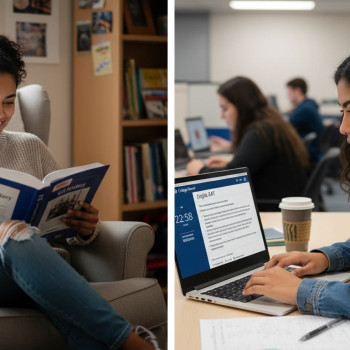When Your School Has No AP Teachers: You’re Not Alone — And You Can Still Succeed
Imagine the bell rings, lunch ends, and you walk into a classroom that’s not offering the AP class you hoped for. Maybe your school is small, understaffed, or stretched thin. Maybe the district can’t hire a qualified teacher. Whatever the reason, the absence of an in-person AP teacher can feel like a roadblock — but it doesn’t have to be a dead end.
This guide is for students and parents who are navigating the AP world without a dedicated classroom teacher. We’ll cover practical strategies for self-study, reliable proctoring options, how to build a study schedule, test-day logistics, and ways to bring structure and accountability into your preparation. Along the way, you’ll find examples, comparisons, and real-world tips — and learn when targeted support such as Sparkl’s personalized tutoring can make a crucial difference.
Why Self-Study for AP Is a Real Option
AP exams measure mastery of college-level concepts and the ability to demonstrate that mastery on a standardized exam. Many students succeed through self-study because AP courses are, by design, aligned to clear course frameworks and exam descriptions. If you can access the syllabus, practice exams, and high-quality resources, you can build most of what a classroom teacher provides: structure, content delivery, practice, and feedback.
That said, self-study requires discipline, an effective plan, and good feedback loops. Below are the essential building blocks.
Essential Building Blocks for Successful AP Self-Study
- Clear understanding of the AP course framework and exam format
- A realistic, paced study schedule with milestones
- High-quality content resources (textbooks, online lectures, past free-response questions)
- Regular practice with timed exams and free-response writing
- Feedback — through peers, online graders, tutors, or proctors — to correct misunderstandings
- Administrative arrangements for official proctoring on exam day

Plan First: Building a Realistic Self-Study Roadmap
Before you open a textbook, create a roadmap. This is the single most important step that separates scattered studying from consistent progress.
Step 1 — Assess the Timeline
Decide whether you’ll prepare during the school year or over the summer. Summer self-study gives breathing room; the school year offers a daily routine. Either way, set your exam date as the anchor and count backward. For most AP exams, 3–6 months of regular, focused study is realistic for a motivated student starting from grade-level readiness; students starting with weaker backgrounds may need more time.
Step 2 — Break the Content into Manageable Units
Divide the course framework into units or themes. Each week should have a clear objective: a topic to master, a set of practice problems, and a short checkpoint (quiz or timed question set).
Step 3 — Schedule Practice Tests Regularly
Take at least one full-length practice exam every 3–4 weeks, and increase frequency as the real exam approaches. Timed, full-length practice is the best predictor of exam readiness because it exposes endurance issues and pacing problems early.
Resources That Replace a Classroom Teacher
When a teacher isn’t available, you’ll need to assemble a curriculum from other trusted resources. Aim for materials that mirror the AP framework, give detailed answer explanations, and include past free-response questions.
Recommended Resource Types
- Official exam descriptions and sample questions (for understanding grading rubrics)
- AP-style textbooks and review books that align to the framework
- Video lecture series and recorded classroom lessons for concept explanation
- Question banks and practice tests with scoring guides
- Peer study groups or online forums for discussion and perspective
Note: Quality matters. Skipping explanations and jumping to answer keys won’t help. Look for resources that explain not just what is right, but why other answers are wrong.
Accountability: How to Get Feedback Without a Teacher
Feedback is the engine of improvement. Without a teacher, seek alternatives that provide timely, specific input on your work.
Feedback Options
- Peer review: swap essays or problem sets with classmates and grade against the rubric
- Online graders: many services offer scored feedback on practice free-response answers
- 1-on-1 tutoring: working with a tutor can speed progress by targeting weaknesses — Sparkl’s personalized tutoring, for example, offers tailored study plans, expert tutors, and AI-driven insights that help zero in on high-impact improvements
- Teacher mentors: some districts allow a teacher from another school to provide occasional guidance or score practice work
Proctoring: How to Take the Official AP Exam If Your School Doesn’t Offer It
AP exams are tightly administered. If your own school doesn’t run AP exams or lacks AP-certified proctors, don’t panic — there are established options to ensure you can sit for the exam.
Common Proctoring Solutions
- Neighboring high schools: many schools will allow students from other districts to register and test at their site.
- District offices or regional testing centers: some districts centralize AP testing at one location.
- Community colleges and universities: in some areas, local institutions serve as proctoring sites.
- Online and digital AP exams (where applicable): check current AP policies; certain AP subjects offer digital testing formats that may have different administration rules.
Start this conversation early with your school counselor. They will know district procedures and the deadlines for registering and securing a proctor. Administrative steps are often the bottleneck, not the studying itself.
Checklist for Proctoring Arrangements
| Task | Who Does It | When |
|---|---|---|
| Confirm school policy on external test-takers | School Counselor | As soon as you decide to take the exam |
| Reserve seat at testing site | Testing Site Coordinator / Counselor | Several weeks before exam |
| Complete College Board exam registration | Student / Parent | Before registration deadline |
| Confirm proctoring rules and ID requirements | Testing Site | 1–2 weeks before exam |
Study Routines That Work: Sample Weekly Plan
Below is a flexible weekly template. Tailor it to the subject and your starting knowledge.
Weekly Study Template (Example for a 12-Week Cycle)
- Monday: New content — read and take notes, focus on core concepts (60–90 minutes)
- Tuesday: Guided practice — work through example problems or watch concept videos (60 minutes)
- Wednesday: Mixed review — short cumulative quizzes covering this week and prior weeks (45–60 minutes)
- Thursday: Deep practice — free-response or long problems, focus on explanation and structure (60–90 minutes)
- Friday: Reflection — review mistakes, make corrections, and summarize key points (45 minutes)
- Saturday: Full practice block or timed section, followed by careful review (2–3 hours)
- Sunday: Rest or light review — flashcards, concept maps, or a brief group study session (30–45 minutes)
Adjust frequency and intensity depending on proximity to exam day. In the final month, increase full practice exams and reduce new content intake.
Handling the Tough Parts: Essays, Labs, and Performance Tasks
Some AP subjects include extended tasks: essay-writing (History, English), lab-based assessments (AP Biology, Chemistry), or performance tasks (Art and Design). These need special attention because they are evaluated subjectively using rubrics.
How to Master Free-Response and Performance Tasks
- Study the rubric closely — rubrics tell you exactly what graders look for.
- Practice with past prompts — time yourself and then grade against the rubric.
- Seek feedback from someone who understands the rubric (a tutor, online grader, or mentor).
- For labs and performance tasks, simulate the task at home and document your process; create a portfolio of practice work.
Free-response practice is one area where a tutor’s feedback can multiply your score gains. A focused 1-on-1 session to review a handful of essays can teach pattern recognition in grading and improve your ability to write to the rubric — an efficient use of time and resources. Sparkl’s tutoring has helped many students by offering targeted feedback and customized practice on these exact formats.
Staying Motivated: Routines, Rewards, and Mental Health
Self-study is a marathon, not a sprint. Motivation ebbs and flows. Practical strategies help maintain momentum without burning out.
Motivation Strategies
- Set micro-goals and celebrate them — small wins compound into big results
- Mix study types — alternate reading, practice, and active recall to keep sessions engaging
- Find an accountability partner or group — regular check-ins create gentle pressure to stay on track
- Schedule breaks and active recovery — sleep, exercise, and social time sharpen learning
Real-World Examples: How Students Succeed Without a Classroom Teacher
Here are two anonymized, composite examples based on patterns that work in the real world:
Case A — Maya: AP Calculus AB, Rural High School
Maya’s school offered no AP Calculus teacher. She used a combination of a college-level calculus textbook, a structured video lecture series, and weekly problem sets. Maya joined a regional testing site and met with a tutor for two hour-long sessions per week focusing on problem-solving and timed practice. On test day she scored a 4. Her success came from disciplined practice, targeted tutoring, and simulating timed exams.
Case B — Luis: AP U.S. History, Small District
Luis relied on past free-response questions, primary-source packets, and a structured essay schedule. He formed a weekly online study group to debate interpretations and traded essays for peer review. For three months, Luis worked one evening a week with an experienced AP history tutor who helped him refine thesis statements and evidence use. He earned a 5, largely due to consistent writing practice and iterative feedback.
What Families Can Do to Support Self-Study
Parents play a vital role in creating the right environment for self-study. Support doesn’t mean becoming a content expert — it means helping with logistics, structure, and encouragement.
Practical Parental Support Ideas
- Help set up a quiet, consistent study space
- Assist with scheduling and calendar reminders
- Arrange transportation to a testing site or tutor sessions
- Celebrate milestones and provide emotional support during tough patches
Parents who understand the administrative steps — registration deadlines, proctor confirmations, and ID requirements — remove a major burden and let the student focus on learning.
When to Consider Investing in Tutoring or Structured Help
Many students succeed entirely through self-study and peer support, but there are predictable points where tutoring provides high leverage:
- When scores are plateauing despite consistent practice
- For subjects with heavy free-response or lab components needing specialized feedback
- If the student lacks a foundational background in prerequisite topics
- When you want a targeted, time-efficient strategy to improve specific skills (e.g., essay structure, calculus problem types)
Tutoring can offer a structured plan, accountability, and immediate feedback. Services like Sparkl pair students with expert tutors and create tailored study plans, combining human teaching with AI-driven insights to identify high-impact areas for improvement.
Final Checklist: Are You Ready to Take an AP Exam Without a School Teacher?
| Readiness Item | Yes / No | Action If No |
|---|---|---|
| I have the AP course framework and exam format | Yes | Gather official descriptions and sample questions |
| I have a study schedule and milestones | Yes | Create a weekly plan and set practice-test dates |
| I can access reliable practice questions and explanations | Yes | Find textbooks, question banks, and video lectures |
| I have a plan for scoring and feedback | Yes | Arrange tutors, peer review, or online graders |
| I’ve confirmed proctoring and registration logistics | Yes | Contact school counselor or testing site immediately |
Parting Advice: Confidence, Not Perfection
Being without an AP teacher is inconvenient, but it also creates an opportunity to build independent learning skills that will serve you in college and beyond. The path includes thoughtful planning, regular practice, and reliable feedback. Use resources strategically: combine free materials, well-reviewed textbooks, practice exams, and targeted tutoring where necessary.
Remember: small, steady gains add up. Schedule your practice, simulate the exam, get honest feedback, and refine your strategy. If you ever feel stuck, short bursts of expert guidance — like a few sessions with an AP-savvy tutor or a customized study plan from a service such as Sparkl — can amplify your results and get you back on track.

Resources to Keep Handy (Quick Reference)
- Official AP exam descriptions and sample questions
- Practice exam schedules and registration dates (confirm with your counselor)
- Local testing sites and contact information
- List of potential tutors and tutoring services for targeted help
Whether you choose a solo path, join a study group, or blend self-study with periodic tutoring, you can reach your AP goals without a classroom teacher. The key is structure, practice, and honest feedback. You’ve got this — and people and services are available to help you cross the finish line.
Need help laying out a personalized plan?
If you want, I can draft a 12-week study calendar tailored to a specific AP subject, estimate weekly time commitments, and suggest practice-test milestones. Tell me which AP exam you’re targeting and what month you plan to take it, and we’ll build a concrete plan together.
















No Comments
Leave a comment Cancel